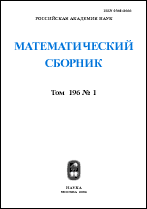|
On two-dimensional polynomial interpolation
A. A. Akopian, O. V. Gevorgyan, A. A. Sahakian
Abstract:
A tuple $\mathfrak{N}=\{n_1,\,n_k;\,n\}$ of positive integers with $\sum_{\nu=1}^k n_\nu(n_\nu+1)=(n+1)(n+2)$ is said to be regular if there exists a set
$U=\{u_1,\,\dots,\,u_k\}\subset\mathbb{R}^2$ such that the Hermite interpolation problem
$(\mathfrak{N},\,U)$ is regular, i.e., for arbitrary numbers $\lambda_{(i,j),\nu}$, $i+j<n_\nu$, $\nu=1,\dots,k$, there exists a unique polynomial $P(x,\,y)\in\pi_n(\mathbb{R}^2)$ such that
$$
{\partial^{i+j}\over\partial x^i\partial y^j}P(x,y)\big|_{u_\nu}=\lambda_{(i,j),\nu},\qquad i+j<n_\nu,\quad
\nu=1,\dots,k.
$$
In this paper an algorithm is obtained that completely describes the regular and singular tuples $\mathfrak{N}$ under the condition that $n_{10}=1$. In the case when only the derivatives of order $n_\nu$ are interpolated, necessary and sufficient conditions are obtained for an arbitrary tuple $\mathfrak{N}$ to be regular.
Received: 21.11.1990
Citation:
A. A. Akopian, O. V. Gevorgyan, A. A. Sahakian, “On two-dimensional polynomial interpolation”, Russian Acad. Sci. Sb. Math., 76:1 (1993), 211–223
Linking options:
https://www.mathnet.ru/eng/sm1049https://doi.org/10.1070/SM1993v076n01ABEH003409 https://www.mathnet.ru/eng/sm/v183/i6/p111
|


|




 Contact us:
Contact us: Terms of Use
Terms of Use
 Registration to the website
Registration to the website Logotypes
Logotypes








 Citation in format
Citation in format 